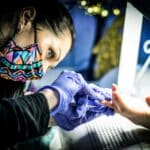Image Commercially Licensed From: DepositPhotos
Importance of Breast Health
Breast health is an integral aspect of overall well-being, deserving our attention and proactive efforts. Recognizing the significance of maintaining optimal breast health is not only a matter of personal responsibility but a crucial component of public health awareness. In recent years, there has been a growing emphasis on the need for regular breast self-examinations and heightened awareness about breast cancer.
Breast cancer is a pervasive concern affecting a significant number of individuals globally. Acknowledging the prevalence and potential severity of this disease underscores the importance of prioritizing preventive measures and early detection.
The Role of Self-Examinations
One of the fundamental steps in promoting breast health is encouraging regular self-examinations. Individuals, regardless of age or gender, should be well-informed about the proper techniques for self-examinations and the signs that warrant professional medical attention. Early detection through self-examinations has proven to be a valuable tool in the fight against breast cancer, enabling prompt medical intervention and significantly improving outcomes.
While the medical community plays a vital role in providing guidance and expertise, the onus is on individuals to actively engage in self-monitoring. Timely identification of changes in breast tissue can be a critical factor in addressing potential health concerns and preventing the progression of conditions such as breast cancer.
Raising Awareness about Breast Cancer
In addition to individual efforts, community-wide awareness campaigns play a pivotal role in addressing breast health concerns. Raising awareness about breast cancer goes beyond the individual and extends to fostering a collective understanding of risk factors, preventive measures, and available support systems.
Community engagement initiatives, such as informational sessions, workshops, and awareness drives, contribute to dismantling myths surrounding breast health and cancer. Dispelling misinformation and fostering a culture of open communication are essential components of a comprehensive approach to breast cancer awareness.
The Challenge of Overcoming Stigma
Despite progress in awareness campaigns, one must acknowledge the persistent challenge of overcoming societal stigma associated with breast health and cancer. Cultural taboos and misconceptions continue to impede open discussions and hinder individuals from seeking timely medical assistance. Addressing these ingrained beliefs is a complex task that necessitates not only informative campaigns but also a concerted effort to reshape societal attitudes.
Emphasizing Timely Intervention
Early detection remains a cornerstone in the battle against breast cancer. Emphasizing the importance of routine screenings, mammograms, and prompt medical consultations cannot be overstated. Healthcare professionals play a crucial role in guiding individuals through the process of screenings and ensuring that potential issues are identified at the earliest possible stage.
Conclusion
In conclusion, prioritizing breast health and fostering awareness about breast cancer are fundamental aspects of individual and public well-being. By encouraging regular self-examinations, promoting open dialogue, and emphasizing the significance of early detection, we can collectively contribute to a healthier and more informed society.
Summary
This editorial underscores the importance of breast health and breast cancer awareness. It emphasizes the role of self-examinations in early detection and the need for community-wide initiatives to dispel myths and promote open communication. Despite progress, societal stigma remains a challenge, highlighting the ongoing effort required to reshape attitudes. Timely intervention through routine screenings is crucial, with healthcare professionals playing a pivotal role. By actively engaging in these practices, we can work towards a healthier future and a society well-informed about breast health.









